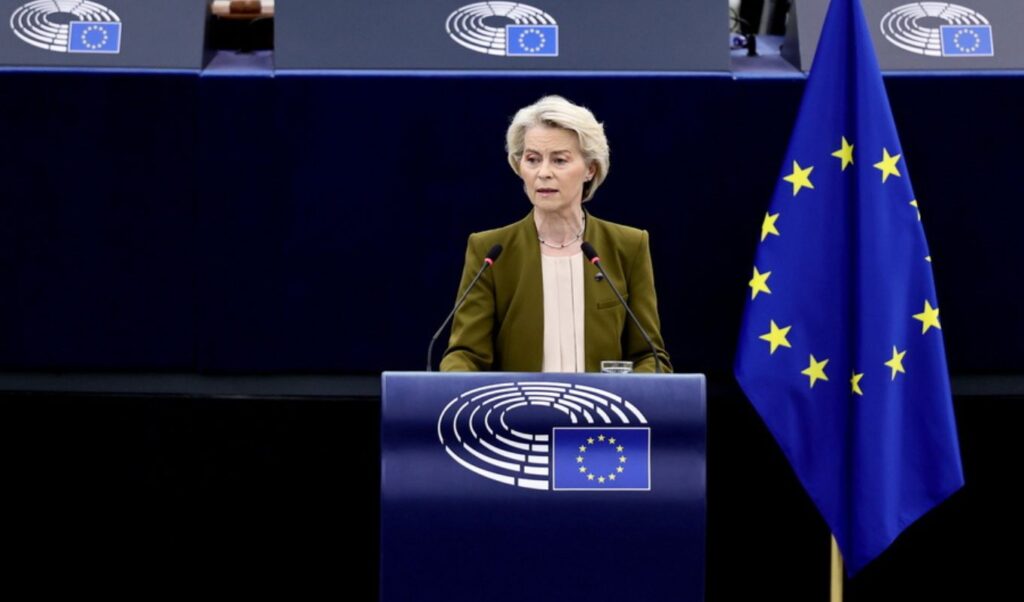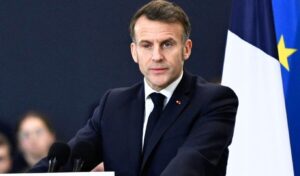European Commission President Ursula von der Leyen is facing her second motion of no confidence within three months, as the head of the European Commission is once again being tested during a period of seeking balance with major challenges ahead. However, it seems practically impossible for her to “lose” this “battle,” as out of the total 719 MEPs, a two-thirds majority (480 votes) is required for the motion of censure to “pass.”
On October 9 (during the plenary session in Strasbourg running from Monday to Thursday), two separate votes on motions of censure will take place: one from the far-right Patriots for Europe group and another from The Left group. The fact that these procedures were initiated by the political “extremes” clearly diminishes their momentum, with centrist European political groups appearing unwilling to support radical change. Moreover, at last Monday’s meeting (September 29), according to Politico’s reporting, it was confirmed that the liberal Renew for Europe (with 5 Commission members from its ranks) and the Social Democrats (with 4 Commission members) will not support the motion of censure. According to a statement by Social Democrat spokesperson Iratxe Garcia to Politico, “key negotiations” are underway for the Commission’s 2026 program, with the three European groups (including the dominant European People’s Party) frequently reaching agreements to co-shape legislative work.
Second motion of censure within three months for Ursula von der Leyen
However, warning signals for Ursula von der Leyen have been sounding for some time: beyond the fact that – unlike in national parliaments, deviations from the “party line” are not ruled out – the mere fact that a second motion of censure was filed against her within three months, when the previous one was filed in 2014, demonstrates the increasing level of dissatisfaction. Meanwhile, although the procedures are once again initiated by the parliamentary extremes of the “Hemicycle” (European Parliament), it should be noted that participation in them appears to be increasing: The previous motion of censure (filed before summer) was submitted by Polish and Romanian delegations of the European Conservatives and Reformists (ECR, the 4th largest parliamentary group), while this time it was submitted by Patriots for Europe and The Left (the 3rd and 7th largest parliamentary groups, numbering 125 seats together).
The two groups that submitted the motions of censure in Strasbourg accuse the Commission President of weakening the EU, lack of transparency, poor judgment on trade agreements with the US and Latin America, her stance toward Gaza, abandoning farmers, and weakening climate rules.
European Parliament: After the motion of censure, the budget – Reactions to agricultural policy
Some of these issues cause “friction” even within the political groups that support the Commission President, with reactions recorded even within the EPP regarding (according to Politico) the imposition of sanctions on Israel, which were announced from the European Parliament podium during Von der Leyen’s State of the Union speech without prior consultation. The European Parliament has previously clashed with the Commission on a series of issues where it feels bypassed, with member states being given priority over the usual legislative procedure (such as Defense, which led the European Parliament to appeal to the European Court of Justice on August 20 against the Commission and Council regarding the SAFE program, considering that the Commission activated an emergency procedure to bypass Parliament).
Meanwhile, although the Commission head appears ready to overcome this obstacle (even if surprising moves are observed, such as Le Pen’s “protégé” Jordan Bardella supporting The Left’s motion of censure), a new “headache” emerges related to the €1.8 trillion budget, prompted by the EPP and Socialists. According to related reports, both political groups seek the withdrawal of a plan to consolidate agricultural funds and regional payments – which constitute more than 50% of the budget – into a single fund managed by member state governments. “The S&D group is ready to ask the Commission to withdraw its proposal for national plans for the next Multiannual Financial Framework,” a spokesperson for the European group told Euractiv on Friday (October 3).
Meanwhile, the EPP is “annoyed” by how the Commission “plans to undermine agricultural policy,” an EPP spokesperson said at a press conference on Friday, with the annoyance concerning both the issue of giving national governments a primary role and the reduction of funds. According to Euractiv, the EPP met in Poland on Thursday to discuss whether to fully reject national plans or try to modify the proposal in a way that doesn’t “re-nationalize” EU agricultural policy, creating rivalries between Union countries. “Let’s not send mixed messages,” was the EPP’s message to the Commission during the Agriculture and Rural Development Committee (AGRI) session, where it gave the “green light” to a package of measures simplifying the Common Agricultural Policy (CAP). “Farmers need support, flexibility and legal certainty – we call on the Commission to stop sending contradictory messages. On one hand, it promises to reduce bureaucracy, while on the other, it undermines CAP in the EU’s long-term budget. Good intentions will lead nowhere if CAP disappears,” said MEP Dan-Ştefan Motreanu, the EPP Group’s lead negotiator on this issue.
If Socialists (who also react to what they consider reduced budget allocations for social projects) and the EPP proceed with these moves, it doesn’t seem unlikely they could become obstacles in negotiations for the entire 2028-2034 budget. Ursula von der Leyen finds herself seeking balance in a fragmented scenario.




